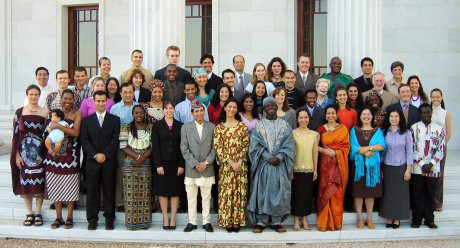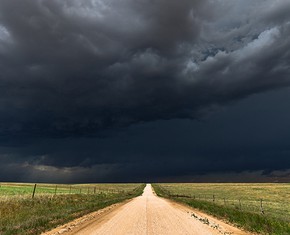The views expressed in our content reflect individual perspectives and do not represent the authoritative views of the Baha'i Faith.
For the Baha’is, and for many people, the concept of a world order — a federation of the globe’s nations, a universal tribunal, a Parliament of Man — represents the inevitable next step in our collective maturation; humanity’s best hope for peace, justice and the protection of our planet’s environment.
But for some, the thought of a world order brings up fears of a dystopian, Orwellian regime with totalitarian aims – something to be avoided at all costs. A world order ruled by religious teachings, or conceived as a one-religion authoritarian state, frightens others even more.
As they describe what form and functions a future world order could potentially fulfill, the Baha’i teachings also explain how that vision of a new global government would guard against such negative dystopian outcomes. In this portion of our exploration of the idea of theocracy, let’s take a look at those safeguards and consider them.
Most importantly, the Baha’i Faith incorporates, at its very core, the democratic ideal. Every Baha’i decision-making body is democratically-elected, and no clergy exists in the Baha’i Faith. That fact in itself rules out the possibility of a Baha’i theocracy:
The foundation of this Cause is pure spiritual democracy, and not theocracy. – Abdu’l-Baha, Baha’i Scriptures, p. 449.
Also – and this point is critical in understanding Baha’u’llah’s concept of a world order — Baha’i laws apply only to Baha’is. Accepting the Baha’i Faith is entirely voluntary – Baha’u’llah forbids any form of coercion, compunction or proselytizing. Unlike some religions, each Baha’i has complete freedom to withdraw from the Faith, as well. When Baha’u’llah laid out the spiritual laws and ordinances Baha’is should endeavor to follow, he wrote that they are binding only on the Baha’is. In other words, Baha’i law applies to those who have freely, and without coercion of any type, accepted Baha’u’llah’s message and become Baha’is. Baha’is have no interest in imposing Baha’i views, ordinances or laws on others:
It is not our purpose to impose Baha’i teachings upon others by persuading the powers that be to enact laws enforcing Baha’i principles, nor to join movements which have such legislation as their aim. – The Universal House of Justice, 21 June 1968.

Baha’i World Center
Equally importantly, the Baha’i Faith encourages the independent investigation of truth, supports free thought and upholds the right of every person to believe as they see fit:
Just as in the world of politics there is need for free thought, likewise in the world of religion there should be the right of unrestricted individual belief. Consider what a vast difference exists between modern democracy and the old forms of despotism. Under an autocratic government the opinions of men are not free, and development is stifled, whereas in democracy, because thought and speech are not restricted, the greatest progress is witnessed. It is likewise true in the world of religion. When freedom of conscience, liberty of thought and right of speech prevail — that is to say, when every man according to his own idealization may give expression to his beliefs — development and growth are inevitable. – Abdu’l-Baha, The Promulgation of Universal Peace, p. 197.
This new way of looking at faith – as the free exercise of each person’s conscience and consciousness – differs drastically from many of the old and ossified religious traditions. Baha’is see no differences between us and them. To a Baha’i, there are no insiders and outsiders, no saved or damned, no clean and unclean, no believer and apostate, no righteous and infidel, no Other:
A fundamental teaching of Baha’u’llah is the oneness of the world of humanity. Addressing mankind, He says, “Ye are all leaves of one tree and the fruits of one branch.” By this it is meant that the world of humanity is like a tree, the nations or peoples are the different limbs or branches of that tree, and the individual human creatures are as the fruits and blossoms thereof. In this way Baha’u’llah expressed the oneness of humankind, whereas in all religious teachings of the past the human world has been represented as divided into two parts: one known as the people of the Book of God, or the pure tree, and the other the people of infidelity and error, or the evil tree. The former were considered as belonging to the faithful, and the others to the hosts of the irreligious and infidel — one part of humanity the recipients of divine mercy, and the other the object of the wrath of their Creator. Baha’u’llah removed this by proclaiming the oneness of the world of humanity, and this principle is specialized in His teachings, for He has submerged all mankind in the sea of divine generosity. – Abdu’l-Baha, The Promulgation of Universal Peace, p. 454.
You May Also Like
Comments

















2- The last time someone was declared a Covenant-breaker publicly by the Universal House of Justice was as recently as \'the 90\'s or 00\'s and not 1957: an American couple from the state of Oregon. It was published in The American Bahá\'í magazine.
3- That quote from Abdu\'l Baha from "Baha\'i Scriptures" is not authoritative and would best be removed and replaced by something that is authoritative. ...That whole volume is, as has been mentioned, entirely suspect. It is not used and should not be used as a source for Sacred Texts.
2- the last time persons were declared covenant breakers was not 1957 but as recently as the 90\'s or 00\'s in the USA at least.
3- the quote from Abdul Baha from "Bahai Scriptures" is not from an authenticated source and would be best removed and replaced with something more authoritative.
2- The last time someone was declared a Covenant-breaker publicly by the Universal House of Justice was as recently as 'the 90's or 00's and not 1957: an American couple from the state of Oregon. It was published in The American Bahá'í magazine.
3- That quote from Abdu'l Baha from "Baha'i Scriptures" is not authoritative and would best be removed and replaced by something that is authoritative. ...That whole volume is, as has been mentioned, entirely suspect. It is not used and should not be used as a source for Sacred Texts.
The Baha'i principles of the oneness of humanity and the unity of religions mean that no one is ever considered an infidel, as "unclean" or as someone who has committed apostasy. Those designations are actually forbidden by Baha'i law. Baha'is are free to believe as they see fit, to independently investigate the truth, and to form their own understandings of their Faith.
However, breaking the Baha'i Covenant--which involves ...openly and insistently claiming to be an authoritative interpreter of the Baha'i Faith, or attempting to take individual power and create schism within the Baha'i community--also violates Baha'i law. Only the Universal House of Justice, the democratically-elected body that administers the affairs of the global Baha'i community, can make the determination that someone is a covenant-breaker. When they do so, Baha'is simply try to avoid contact with that person to protect the unity of the Faith--which has, for almost two centuries now, remained one unified religious body.
The last time I can remember the Universal House of Justice making this kind of rare determination was in 1957, when an individual Baha'i tried to usurp power after the death of Shoghi Effendi, the Guardian of the Baha'i Faith. That person was declared a covenant-breaker, and his attempts to provoke sectarian schism and division in the Baha'i community withered and died as a result.
I hope this is helpful.
The source for this is Bahai Scriptures, which is a mishmash of good and bad texts. This particular bit probably comes from Ahmad Sohrab, since the same words are found in Sohrab's "I Heard Him Say," page 120,
http://www.h-net.org/.../books/P-T/S/sohrab/IHS120.gif
published in 1937. While Bahai scriptures was published in 1923, it is very likely that Sohrab had communicated the text in a private letter or a letter to be published in a Bahai newsletter before it was included in "I heard Him say."
Sohrab is very ...free in attributing his own ideas to Abdu'l-Baha, and inserting them in his translations of tablets (although he uses parentheses when he does this in translations; unfortunately editors in books such as Bahai world Faith remove the parentheses and leave the comments in !). So where he is the only known source of words, they must be regarded as doubtful.
There are plenty of readily authenticated quotes in the authenticated works of Abdu'l-Baha for all the major principles and for the tenor and spirit of Abdu'l-Baha's teaching work. For example:
======
“Should they place in the arena the crown of the government of the whole world, and invite each one of us to accept it, undoubtedly we shall not condescend, and shall refuse to accept it.” ( Tablets of the Divine Plan 51)
The signature of that meeting should be the Spiritual Gathering (House of Spirituality) and the wisdom therein is that hereafter the government should not infer from the term “House of Justice” that a court is signified, that it is connected with political affairs, or that at any time it will interfere with governmental affairs. … (Tablets of Abdu’l-Baha Abbas vol. 1, page 5).
One of their many calumnies was that this servant had raised aloft a banner in this city, had summoned the people together under it, had established a new sovereignty for himself, … and, God forbid, had purposed to cause the gravest breach in the mighty power of the Crown.
May the Lord protect us from such atrocious falsehoods! According to the direct and sacred command of God … We must obey and be the well-wishers of the governments of the land, regard disloyalty unto a just king as disloyalty to God Himself and wishing evil to the government a transgression of the Cause of God. With these final and decisive words, how can it be that these imprisoned ones should indulge in such vain fancies; incarcerated, how could they show forth such disloyalty!” (Will and Testament of Abdu’l-Baha, pages 7-8)
The signature of that meeting should be the Spiritual Gathering (House of Spirituality) and the wisdom therein is that hereafter the government should not infer from the term “House of Justice” that a court is signified, that it is connected with political affairs, or that at any time it will interfere with governmental affairs. Hereafter, enemies will be many. They would use this subject as a cause for disturbing the mind of the government and confusing the thoughts of the public. (Tablets of Abdu’l-Baha Abbas vol. 1, page 5).
During the conference no hint must be entertained regarding political affairs. All conferences must be regarding the matters of benefit, … If any person wishes to speak of government affairs, or to interfere with the order of Governors, the others must not combine with him because the Cause of God is withdrawn entirely from political affairs; the political realm pertains only to the Rulers of those matters: it has nothing to do with the souls who are exerting their utmost energy to harmonizing affairs, helping character and inciting (the people) to strive for perfections. Therefore no soul is allowed to interfere with (political) matters, but only in that which is commanded.
(National Bahai Archives (US), unpublished Tablets of Abdu’l-Baha, printed in Baha’i World Faith, 407)
… this sect have no worldly object nor any role in political matters. The fulcrum of their motion and rest and the pivot of their cast and conduct is restricted to spiritual things and confined to the doctrine of the unity of the prophets; it has no role to play in the affairs of the government nor any connection to the seat of sovereignty. Its principles are the proclamation of the praises of God, the investigation of signs, the education of souls, the reformation of characters, the purification of hearts, and illumination with the gleams of enlightenment. …
[the Bahai scriptures] are entirely taken up with the prohibition of sedition, and with upright conduct amongst mankind, obedience, submission, loyalty, obeying the law, the acquisition of laudable qualities, and encouragements to become endowed with praiseworthy accomplishments and characteristics.
They play absolutely no role in political questions, and do not raise opposition in matters which could cause disturbance or sedition. Under these circumstances the government cannot justly offer excuses, and possesses no pretext [for further persecuting this sect] except [a claim to the right of] interference in thought and conscience, which are the private possessions of the heart and soul. … (A Traveler’s Narrative, 86-88)